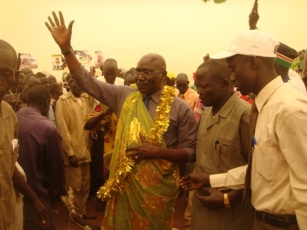Community activities “shake” Northern Bahr el Ghazal governor
November 17, 2013 (JUBA) – Northern Bahr el Ghazal governor Paul Malong Awan has blasted his critics over a series of community activities based around forging unity between political and traditional leadership in the South Sudanese border state.

Awan was speaking at an occasion organised by Aweil graduates at Nyakuron Culture Centre on Saturday, during which he criticised the community’s activities.
“I will leave only through elections. Those talking about community leadership should go home. This is not home”, Awan told the audience, mainly comprising of members of his administration and a handful of supporters with invited guests from other communities.
Awan was the zonal commander fighting for the former rebel-turned ruling party, the Sudan People’s Liberation Movement (SPLM), which surfaced after the Sudanese government abrogated the 1972 peace agreement in 1983 which it signed to end the first civil war in the southern region.
Awan was reportedly constantly at odds with the late founding leader John Garang, and other senior members in the leadership over the way he conducts himself, resulting in his arrest in 1991. He was released the following year.
He accused high profile community members of holding regular meetings, calling for the reinstatement of all civil servants claiming to have contested the 2010 elections. These included Aguer Wol Aguer, speaker of the state legislative assembly whom he unilaterally removed in 2012, as well as six members of state parliament whom he also dismissed on unsubstantiated allegations they were acting against the SPLM in collaboration with members of other political parties in the house.
A release dated 11 November bearing Awan’s signature, along with 47 other members in his administration, named Aldo Ajou Deng Akuei, a former deputy prime minister during the Sudanese government under the leadership of Sadig Al Mahdi in the 1980s, as well as the former finance minister in the regional government, Kuol Athian Mawien.
Other former state governors that also stand accused include Madut Biar Yel, Garang Deng Aguer, Ajuong Manyuel Kuel and a highly respected elderly politician, General Kawac Makuei Kawac.
Among those Awan identified as working for his removal from both gubernatorial and community leadership positions were Dhieu Mathok Diing Wol, chairperson of the employees’ chamber at the national government, General Dau Aturjong Nyuol, former national minister of trade and investment, and Garang Diing Akuong.
“Some of the members of Aweil community in Juba who have unlawfully and illegally been speaking on behalf of [the] Aweil community and SPLM are in fact non-members of [the] SPLM and have in the past failed and betrayed [the] Aweil community [and] in particular South Sudan in general”, the release read in part.
“In fact, [the] majority of them, during the April general elections [in] 2010, were contesting as independent candidates and [with the] National Congress Party (NCP) against the SPLM visions and missions and the will of the people”, the release adds.
It further claims that the majority of the politicians he identified as “agitators” remain “bedfellows with Sudan’s ruling National Congress Party” despite secession.
“We wish to remind that they should not be so forgetful of the past misdeeds, records and political affiliations. We would like to make it clear that their betrayal and misdeeds might be forgiven but not forgotten. The recent backstabbing of the people’s cause by majority of people mentioned are vividly still fresh in the minds and hearts of the people of South Sudan”, the release said.
Awan boasted that his administration had done more for the people since he took up the leadership than his predecessors.
He said he should be kept in office so he can continue with his reforms.
“People used buckets as toilets during the period of those who were the governors but now people use latrines. These things do not happen by themselves alone. I have done a lot and I cannot bring these developments and then [be] expected to go”, he said, sparking murmurs among the audience.
“Why does the governor talk like this? He needs advice to use polished language. He is talking to people and as a leader he needs to be more diplomatic and polite”, one of the invited guests from Western Bahr el Ghazal remarked while sitting next to a Sudan Tribune reporter.
“RHYMES OF [A] DYING ANIMAL”
However, his critics quickly downplayed the significance of the accusations, equating them to the “rhymes of [a] dying animal”.
“That is all he knows. He has no single quality of a good leader. Can you imagine that he smokes in the state council of ministers and make rants [and] when asked why he does that? I personally served in his administration because I thought he had [the] heart to serve our people, to work with the people who would help him achieve his development plans but I realised that he has nothing in mind apart from threats, so I quietly quit, although he claimed later [that] he dismissed me”, a former cabinet minister who resigned his position before secession from Sudan told Sudan Tribune.
Sameyo Adut, a former state advisor for peace and reconciliation, said the continued presence of Awan in the state would impact on the relations between the people of Aweil and the central government, particularly during the upcoming 2015 general elections.
Adut said the governor was fooling some people about support the people of Mading Aweil would give the central government if he remains in the state as the governor.
Adut claims Awan has poor relationships with politicians in all the five counties of the state.
Awan contested the 2010 elections as a caretaker governor but has been dogged by consistent accusations of arbitrary actions, constitutional violations, including intimidation tactics, as well the use of government agents to arrest his critics.
(ST)
